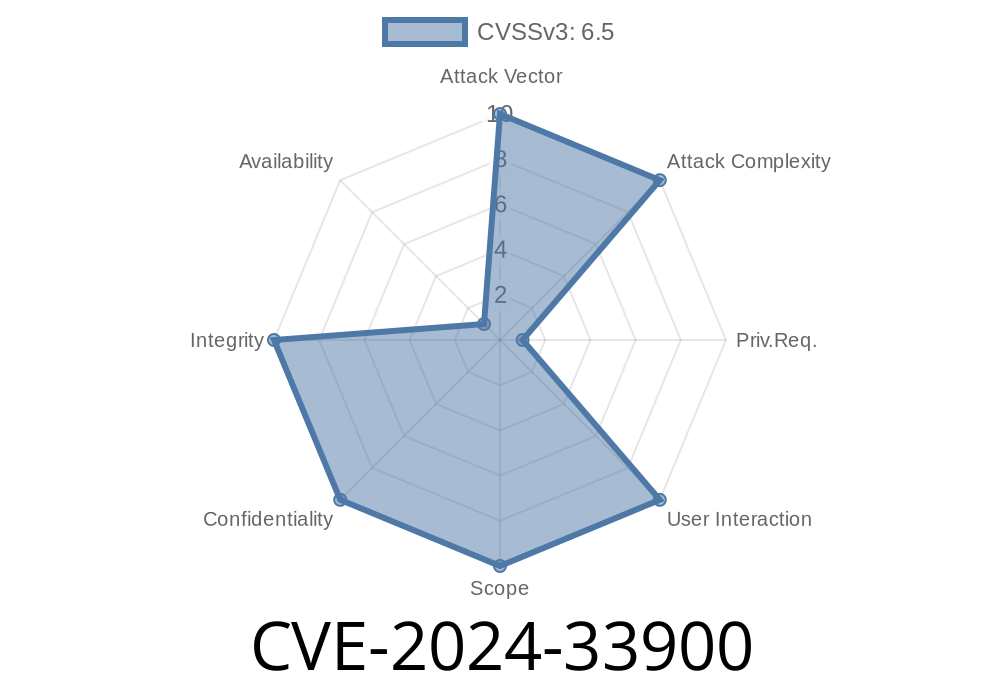KeePassXC is one of the most popular open-source password managers out there, trusted by millions worldwide. But recently, a vulnerability identified as CVE-2024-33900 has made waves in the security community. This post dives deep into how this bug lets attackers steal cleartext passwords using a memory dump, offers code snippets to demonstrate the risk, and surprises you with a vendor response fighting back on the issue.
What is CVE-2024-33900?
In a nutshell, CVE-2024-33900 describes a bug in KeePassXC 2.7.7 where an attacker with access to the victim's privileges (like a local admin or malware running as the user) can dump the application's memory. If the victim recently viewed or copied a password, parts or all of the unencrypted (cleartext) password might still be sitting in the dump. By sifting through this dump, attackers can recover sensitive passwords with little effort.
Reference:
- CVE Details for CVE-2024-33900
- KeePassXC GitHub Issue #11925
Let’s break it down simply
1. Step 1: The victim opens KeePassXC, unlocks their database, and views/copies a password.
2. Step 2: The attacker, already having user-level access, takes a memory dump of the KeePassXC process.
Step 3: The attacker scans this dump looking for cleartext passwords.
Because of how KeePassXC and similar desktop apps manage memory, the password is unintentionally left in a readable form, at least temporarily, in RAM.
Proof-of-Concept: Memory Analysis in Action
Suppose you’re a bored attacker (or a curious admin), and you want to see if this vulnerability is real. Here’s how you could pull this off on Linux with some simple tools.
1. Find the process ID of KeePassXC
ps aux | grep keepassxc
Suppose the output is
alice 1234 1.5 .8 786432 68440 ? Sl 13:13 :02 keepassxc
Here, 1234 is the process ID (PID).
You’ll need root or the same user
sudo gcore 1234
This creates a file called core.1234 in your working directory.
3. Scan the core dump for potential passwords
Suppose you recently copied the password “DragonFruit!2024”. You could look for it (or its parts) in the memory dump using simple strings and grep:
strings core.1234 | grep -i dragon
Or, to pull all possible “password-like” strings
strings core.1234 | grep -E '[A-Za-z-9!@#$%^&*]{8,}'
Even with minimal effort, you might spot real credentials sitting right there in plain sight.
Why Is This a Problem?
Most users expect password managers to keep their secrets _always encrypted_. But once unlocked and in use, these secrets eventually hit RAM in unencrypted form. If anyone grabs a copy of your RAM (a so-called memory dump), they could walk away with your passwords, 2FA codes, and more.
KeePassXC's Response
The KeePassXC development team does not consider this a true vulnerability. In their opinion, any program that must handle data in cleartext _must_ store it in RAM at least temporarily, and there’s no private memory on modern PCs—other desktop apps, browser fields, password programs alike are all at risk.
See the vendor comment on GitHub:
> “This "vulnerability" is nothing more than a misunderstanding of how computers work. We cannot prevent passwords from being present in memory as they are expected to be in use by the user and operating system.”
Lock Down Your PC
1. Don’t Copy Sensitive Stuff Unless Necessary: Copying to clipboard or showing passwords increases exposure.
Windows: Enable BitLocker, minimize unnecessary admin accounts.
- Linux: Use encryption, restrict sudo/users.
Consider Using Hardware Backed Password Apps
Some solutions (like password managers built into modern phones or security keys) isolate secrets better using hardware-protected environments.
Further Reading
- Official CVE Record
- KeePassXC Memory Safety Statement
- How Modern Password Managers Handle Memory
Conclusion
CVE-2024-33900 reminds us: once a secret lands in your RAM, it can be scooped up by anyone with enough access and motivation—even from your favorite open-source password manager. Unless you’re 100% sure your device is safe from other users and malware, your passwords are only ever as safe as your computer itself.
Timeline
Published on: 05/20/2024 21:15:09 UTC
Last modified on: 07/03/2024 01:59:09 UTC
